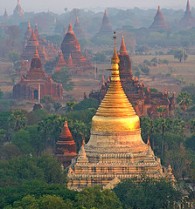Travel Outfitters Assist in Burma Cyclone Relief
Travel Blog • Jim Benning • 05.12.08 | 11:03 AM ET
 The government of Burma (Myanmar) has blocked legions of foreign aid workers from entering the country to help with cyclone relief efforts, but a couple of outside travel companies have been able to offer at least some assistance. Most notably, Colorado-based Asia Transpacific Journeys, with dozens of local staff members and three Westerners in the country, has been distributing thousands of water filters around Yangon, the Los Angeles Times reports. Their efforts raise an interesting issue related to the ongoing debate over the ethics of traveling to Burma.
The government of Burma (Myanmar) has blocked legions of foreign aid workers from entering the country to help with cyclone relief efforts, but a couple of outside travel companies have been able to offer at least some assistance. Most notably, Colorado-based Asia Transpacific Journeys, with dozens of local staff members and three Westerners in the country, has been distributing thousands of water filters around Yangon, the Los Angeles Times reports. Their efforts raise an interesting issue related to the ongoing debate over the ethics of traveling to Burma.
Not long ago, Arthur Frommer, among others, denounced tour operators leading visitors into the country and called on travelers to boycott the nation to avoid propping up its brutal government. Yet many travelers have continued to argue that visiting Burma in a responsible way can help locals and potentially lead to change.
In this case, if you want to see the Burmese people get some help in spite of their government, you have to chalk one up for the pro-visit side, it seems to me. Those travel outfitters with staff and contacts in Burma are in a much better position to help than those that have sought (with the best of intentions) to further isolate the country.
I’d be curious to hear what other think.
Related on World Hum:
* Death Toll Rises in Burma
* Under the Banyan Tree
* Big Brother in Burma
* Burma’s Ongoing Cycle of Despair
Photo by jmhullot via Flickr, (Creative Commons)
Eva Holland 05.12.08 | 12:58 PM ET
Agreed, Jim - with the government blocking aid shipments from major foreign donors, it seems to be a good time to have small-scale contacts on the ground.
I just read about a pair of Canadians in Thailand who’ve hooked up with the Thai rotary club to funnel some aid into Burma: http://matadortravel.com/travel-blog/thailand/nora-dunn/this-is-real-travel-traveling-in-thailand-and-making-a-difference-in-
Tim Patterson 05.12.08 | 3:06 PM ET
I guess it depends on whether you prioritize solving the root cause of the problem or alleviating the immediate suffering of people on the ground in devastated areas. Tourism does help keep the junta in power, although the revenue isn’t so crucial in this age of booming commodity prices when no one cares where their oil originates. I come down on the side of travel to Myanmar, but it’s crucial to make a distinction between folks who fly in to see the temples, stay at a government owned hotel and fly out the next morning, and those who travel close to the ground, consciously minimizing the amount of cash they give to the gov’t.
Nick Page 05.12.08 | 9:39 PM ET
I also agree with Jim. The revenues from travel in Burma are a drop in the ocean to the Junta. Selling travel to Burma in all probability actually costs travel companies in terms of negative press and loss of sales to the “politically correct” brigade who boycott anyone who sells travel to the country. I personally believe there must be travel options available as the majority of any revenue generally helps alleviate poverty, especially when travel itineraries are well prepared with this in mind (make sure you discuss the issue with your specialist operator before booking).
In my personal experience every single person for whom I have arranged travel to the country has returned having both enjoyed the experience and become more aware of the reality of the plight of the people and are in a better position to be able to actually help them. Most who oppose travel there have never been! The blog above just goes to show that the travel industry can help…..even in the most unexpected ways.
Jim Benning 05.13.08 | 1:23 AM ET
Good points. I think you make a good distinction about the style of travel, Tim. And thanks for pointing out that story, Eva. Travelers have the capacity to do a great deal of good.
Jim Benning 05.13.08 | 1:37 AM ET
By the way, interesting post on Foreign Policy’s blog:
“Last week, French Foreign Minister Bernard Kouchner—the founder of Medecins Sans Frontieres (Doctors Without Borders)—suggested that the international community and the UN are obligated to intervene in Burma, regardless of the wishes of the military junta, in accordance with the “Responsibility to Protect”, or R2P, as outlined by the UN at the General Assembly in 2005. The concept asserts that the international community is obligated to intervene in cases where states fail to protect their populations from “genocide, war crimes, ethnic cleansing and crimes against humanity.”
http://blog.foreignpolicy.com/node/8833